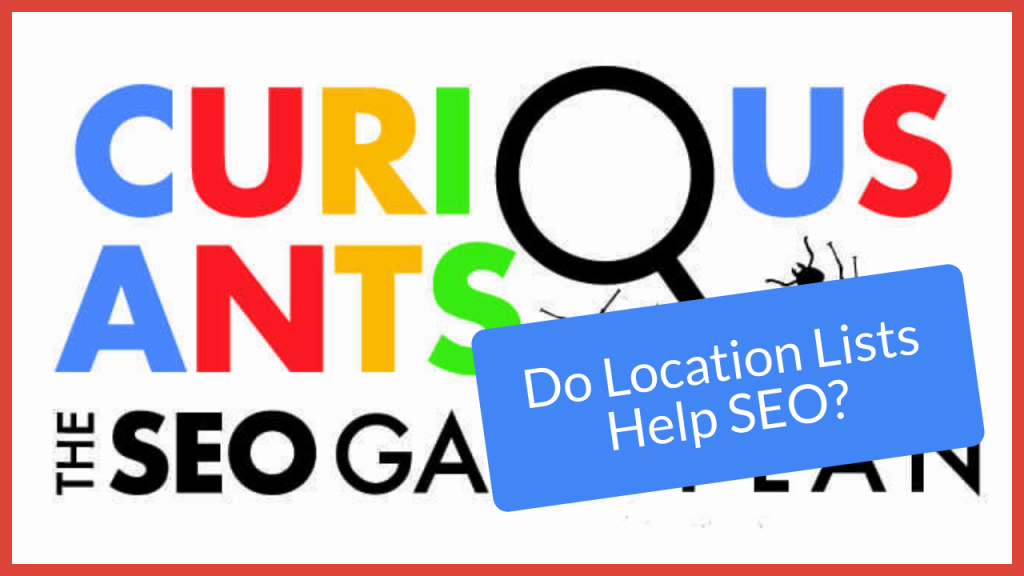Should You List Locations for SEO?

Is listing hundreds of locations on a webpage effective SEO? Learn smarter, strategy-driven approaches to boost local visibility.
Video Transcript
David: Well, let’s get started. Onawa, you asked the first question today about a client asking to have a page with like 400 city and county names on it. Tell us a little bit about this.
Onawa: Yes. Okay. A client request came through and then came to me, and it’s just literally a list of cities and counties in one state for whatever this company does. And I said, “This is a bad idea. Don’t do this.”
David: Yeah.
Onawa: And I kind of over-said why. But obviously, the art director doesn’t care. She’s just like, whatever, just do it, and then we’ll tell the customer. So, I thought, well, I’ll ask you and get a better version of what I said, basically. Which is don’t do it. I said, “Google might punish you if you try it.”
David: Oh, you pulled out that thread.
Onawa: Yeah, but it didn’t matter.
David: Yeah, yeah, exactly. I agree with you. It’s not a good idea. It’s really because it’s a waste of time. It’s not that Google will punish you. It’s that Google probably won’t serve this page to anybody because it offers no value. So, it’s wasted time that could be spent better elsewhere. So, the way I push back is, what do you think this will accomplish? What do you really want to accomplish? Rather than give us the tactics you think, help us understand the intent, and we can provide the strategy that will follow the tactics. I had a client this last week say, “David, we want to do domain rank backlinks.” What’s a domain rank backlink? I’ve never heard that phrase before, and sometimes I feel a little self-conscious. I realized they were just trying to talk about backlinks, and they thought about it in terms of the domain rank value for it. So, we kind of talked about how doing the tactic without a strategy isn’t as effective as having a strategy. So clearly, they want to be found in local locations for that, so we can talk about strategies to help. One of my favorite strategies for this is the blog. Let’s pretend this company serves a great number of cities with a bathtub refinishing company. So, rather than having a page that lists cities in which they happen to do bathtub refinishing, what if they were to have a 500-word summary of a project in every town that they’ve ever served with pictures before and after? A 500-word summary, anybody can write that. In Fredericksburg, Maryland, we did this bathroom refinishing project. Here’s what it looked like before. Pink tile from the 1950s. Here’s what it looked like afterward. Sleek, modern, comfortable. Wouldn’t you like to do that? That would accomplish what this tactic is supposed to be doing. Yes, it’s actually more work than a page vomit of locations, but this would actually work. But the best thing I like about this strategy is that even if it doesn’t work for SEO, it’s still a wonderful thing on the website to showcase what you do. So that’s how I would approach that problem. I feel the frustration. I’ve sometimes threatened clients with “Google will ban you” when it’s not necessarily the case. Right? I get that. In this case, it’s just wasted effort. If you want to accomplish what I think you want to accomplish, there’s a much better way to do this. Yeah, it’s a lot harder, but it will actually do something for you. And even if we don’t have 400 blog posts next month with 400 different projects in 400 different towns in the state, if we get two, those two are going to be more effective than the 400 locations listed on a page. Does that help give you some ammunition?
Onawa: Yeah. Unfortunately, I already built the page.
David: Okay.
Onawa: And it did take me hours.
David: Yeah. So, the value-add is to say, “See how it hasn’t done anything? Let’s do something different.”
Tricia: And can I add a recommendation? So also, I’m assuming that they’re a local business and they can have a Google Business Profile, that they’re eligible. So, I would also have whatever link on their Google Business Profile may not be their homepage, or maybe it can be, but whatever page that’s linking to, to not list like you have the areas but talk about the area that the business is in. Like we’re in whatever area, or we cover this area, and talk a little bit about the area that will help, and the services offered in those areas. Kind of like a homepage probably should, but be specific about those areas. If they want the homepage to be more general, do a location-specific page with the information and have the Google Business Profile primary link to that.
David: Okay.
Tricia: When they see it doesn’t work, then you can recommend those two things.
Onawa: Okay. I mean, I usually try, and I can advise people strongly to do a Google Business Profile because a lot of times, they’ll skip that step and then go directly to SEO. And that seems too valuable to miss.
Tricia: Yeah. Especially for local SEO, definitely.
David: Yeah. Yeah, great, great question. Unfortunately, that tactic hasn’t gone to bed yet.
Onawa: Yeah, I said it was a very outdated way to try and do what I think you’re doing. There’s no other reason to do that. It’s not going to do what you think it will.
David: So, the hours that it took you to build could have been much better.
Onawa: Yeah.



